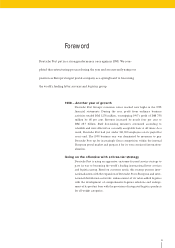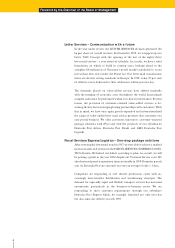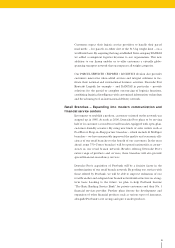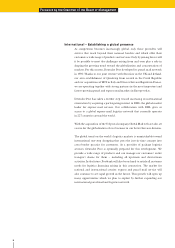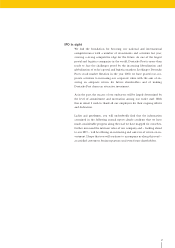DHL 1998 Annual Report Download - page 17
Download and view the complete annual report
Please find page 17 of the 1998 DHL annual report below. You can navigate through the pages in the report by either clicking on the pages listed below, or by using the keyword search tool below to find specific information within the annual report.
13
The European letter mail service market (excluding press item mail) is
currently estimated to be worth more than 45 billion euro. The letter mail
and Infopost markets in Germany – where the number of letter items
mailed per household is smaller than in the USA or France, for example –
offer particularly interesting growth potential.
The international freight mail and logistics business is in the process of
extensive consolidation and concentration. Besides the major integrators,
growing numbers of postal enterprises have begun operating in foreign
domestic markets or offering integrated transborder services through
alliances. In view of the fact that world trade (in goods and services) is
growing approximately three times as fast as production, the cross-border
transport business will continue to gain in importance.
Upon entering into force on 1 January 1998, Germany’s new Postal Act not
only introduced markedly more competition. In some cases, it even in-
creased the amount of regulation in the German postal market. This new
legislation lays down Germany’s regulatory framework for the years up to
2002 and has brought Germany to the forefront of postal liberalization in
Europe, alongside Sweden and Finland. Current regulation differentiates
between three types of postal service: the exclusive license sector (which
will exist until the year 2002 for Deutsche Post), the sector which is other-
wise subject to license and the sector which is open to competition and is
not subject to license. The still remaining sales in the exclusive license field
partially offset the special burdens which Deutsche Post is required to bear.
Germany’s new Postal Services Act created a broad range of market entry
opportunities for Deutsche Post’s competitors. The regulatory authorities
issued licenses for letter mail services to 155 companies in the first year
alone. It is our opinion that a number of these licenses were wrongfully
issued. We have consequently initiated legal action. We do however
fundamentally accept the gradual introduction of “normal” market con-
ditions in the postal industry, when a level playing field can be established
for all providers. The progressive opening of the German postal market
poses a major challenge which we will meet head on.
All in all,the new Postal Act provides an acceptable framework for ensuring
Deutsche Post’s competitiveness. Above all, its enactment allows Deutsche
Post to pursue a forward-looking corporate strategy without the regulatory
uncertainties of the past.


